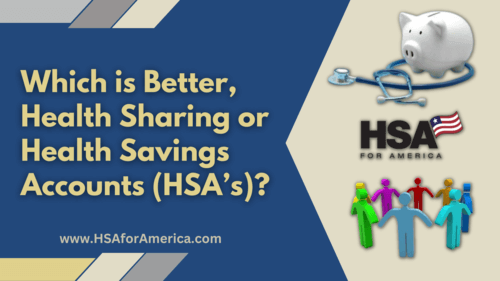As a small business owner or self-employed individual, choosing a healthcare plan can be time consuming, frustrating, and confusing.

Is traditional health insurance the way to go? What about health sharing? Should you use an HSA?
Each of these approaches has its place. One size does not fit all.
But even though you have a lot of choices, choosing a health plan doesn’t have to be stressful.
At HSA For America, we specialize in helping our clients narrow down the many options quickly and easily… cutting out hours of time, hassle, and stress.
Health Savings Accounts (HSA’s) and health sharing plans are two amazing choices that are revolutionizing the way healthcare is delivered.
These two product types provide unique savings, powerful tax advantages, and help give you more control over your healthcare experience.
However, the correct choice depends on your individual healthcare needs and financial circumstances.
This blog post will discuss HSAs, health sharing plans, and other powerful health plan options so you can make informed healthcare decisions that you can feel great about!
Compare Pricing on the Best Insurance Plans Available
Health Savings Accounts (HSAs)
You’ve probably heard about Health Savings Accounts, or HSAs.
They’re special accounts where you can save money for health expenses, and the money you put in is tax-free! That means you don’t have to pay taxes on money you save for doctor visits, medications, surgeries, ER visits, or other qualified medical expenses.
Plus, unlike flexible spending accounts (FSAs), HSAs have no “use-it-or-lose-it” requirement. if you don’t use all your HSA money in one year, it rolls over to the next year, and continues to compound, tax free, for as long as the money remains in the account.
Benefits of HSAs
- Tax savings. Money you put in an HSA isn’t taxed, which means you save money in income taxes right away. If you’re an employee, you also save on Social Security taxes.
- Tax-free growth. The money in your HSA isn’t lost at year-end; it rolls over to the next year. And it compounds tax-free – as long as you leave the money in your account.
- More Control Over Health Care Decision-Making. You decide how to use your HSA money for health costs. There’s no insurance company to tell you what you can or can’t do, and no narrow network restrictions. You can use your HSA money with any provider.
Tax Benefits of HSAs
Health Savings Accounts (HSAs) offer significant tax benefits, especially for those in higher income-tax brackets:
- Pre-tax contributions. Every dollar you contribute to an HSA directly reduces your taxable income for the year. This reduction applies regardless of whether you itemize deductions or use the standard deduction, providing a direct way to lower your tax bill.
- Tax-deferred growth. Interest or other earnings on your HSA balance aren’t subject to taxes for as long as the funds remain in your account – just like a traditional IRA.
- Tax-free withdrawals for medical expenses. When you withdraw funds for qualified medical expenses, these withdrawals are also tax-free.
This combination of tax-deductible contributions, tax-free growth, and tax-free withdrawals for healthcare expenses makes HSAs a uniquely advantageous savings option.
Note: Withdrawals for non-qualified expenses are taxed and may incur penalties as high as 20%, along with applicable income taxes. So you definitely want to reserve your HSA money for qualified medical expenses.
However, this 20% penalty goes away at age 65.
After that, you can make withdrawals from your HSA for any purpose you like. You just have to pay income taxes on the withdrawal amount, just as you would with a traditional IRA.
However, withdrawals to pay for qualified medical expenses, or even to pay certain long-term care insurance premiums are still tax-free, even after age 65.
So there’s still a benefit to saving your HSA money specifically for qualified medical expenses in retirement.
Learn More: How Much Can an HSA Save in Taxes?
What is Health Sharing?
Health Sharing is an affordable alternative to traditional health insurance approaches. It’s not insurance but a group of people who agree to help pay for each other’s medical bills.
It’s like a community where everyone supports each other. You pay a monthly amount into the health share plan.
If you need medical care, the fellow members of your plan help cover your medical expenses in your time of need, via the plan’s health sharing mechanism.
Benefits of Health Sharing Plans
- COST ADVANTAGES
- Affordability. Health sharing plans are often less expensive than traditional health insurance. This is because they operate with different financial structures and are not subject to the same regulations as insurance companies.
- Shared Expenses. Members contribute to a shared pool of funds, which is then used to pay for eligible medical expenses. This communal approach can lead to lower overall costs for participants.
- No Profit Motive. Since health sharing programs are not for-profit entities, they don’t have the same financial motivations as insurance companies, potentially leading to lower costs for members.
MORE FREEDOM OF CHOICE
- Choose Your Own Doctor. Most traditional health insurance products available on the market today are HMOs and PPOs that restrict non-emergency care to their approved networks of low-bidder providers. In contrast, most health sharing plans allow you to choose your own doctors and hospitals. You are not restricted to a narrow network of authorized providers.
- Nationwide Access. Unlike many HMOs, health sharing plans offer the flexibility to seek treatment from providers across the country – not just in a specific region.
FLEXIBLE ENROLLMENT
- Year-Round Enrollment. Unlike traditional health insurance, which has limited enrollment periods, health sharing plans allow members to join at any time of the year.
- Portability. Health sharing plans are fully portable. They follow you even if you leave your current employer.
Combining Health Sharing With HSAs: How to Get Get The Best of Both Worlds
Until recently, health sharing members who didn’t have a formal health insurance policy couldn’t contribute to an HSA.
That’s because the law required anyone wanting to contribute to an HSA to be covered under a special High Deductible Health Plan. To qualify as an HDHP, these plans had to include ten “Minimum Essential Coverages.”
These are called “MEC” plans.
However, the insurance and health sharing industries continue to innovate. They came up with two ways you can benefit from the tremendous cost savings of health sharing plans while still maintaining eligibility to contribute to an HSA.
These include joining the HSA SECURE plan (for business owners and/or independent contractors) or adding an optional “HSA MEC” mini-insurance policy to your health sharing plan.
HSA SECURE and HSA MEC solutions are two groundbreaking options that represent this synergistic approach. Let’s take a deep dive into each of these incredible options.
What is HSA SECURE?
HSA SECURE is an innovative health sharing solution that combines a special HSA-qualified minimum essential coverage (MEC) insurance plan with a low-cost health sharing plan that focuses on helping you pay for major and catastrophic health care needs.
The built-in MEC policy is what allows you to contribute to an HSA for as long as you are an active sharing member of HSA SECURE.
This allows members to enjoy the cost savings and other benefits of health sharing while still retaining their eligibility to contribute pre-tax dollars to a health savings account (HSA).
Note: Currently, HSA SECURE is only available to business owners, independent contractors, and others with verifiable self-employment income.
Supercharge Your Plan With The HSA MEC Option
The HSA SECURE plan isn’t your only option when it comes to combining the power of health sharing with the tax benefits of an HSA.
Thanks to continuing innovation in the health insurance industry, it’s now possible to upgrade any health sharing plan and become eligible to make HSA contributions.
How? By adding an HSA MEC mini policy to your health plan.
The term “MEC” stands for Minimum Essential Coverages. Here’s how it works:
The “MEC” in “HSA MEC” is essentially a stripped-down, minimum-benefit health insurance plan. It includes only the ten Minimum Essential Coverages required by federal law to qualify as a high deductible health plan (HDHP), and therefore allows you to contribute to an HSA.
Don’t worry, the health sharing plan still shares costs for major and catastrophic medical events. The HSA MEC handles the smaller stuff.
HSA MEC is a valuable add-on to any health sharing plan, enhancing your current health sharing plan to qualify to make HSA contributions.
And because the HSA MEC only handles the small stuff, and does not normally duplicate your health sharing plan’s catastrophic sharing benefits, it keeps costs down.
Meanwhile, if you’re enrolled in a health sharing plan and simultaneously covered under the HSA MEC mini-health insurance plan, you can use your health savings account to set aside pre-tax dollars for medical expenses.
That means you can finally enjoy the tax advantages formerly available only to people with traditional high-deductible health plans.
In this way, health sharing members can finally enjoy the best of both worlds:
- The cost savings of a health sharing plan compared to the much higher monthly cost of an unsubsidized traditional health insurance product, and;
- The triple tax advantages of using an HSA to save in advance for future medical costs.
Compare Pricing on the Best HealthShare Plans Available
What if I Have Pre-existing Conditions?
If you or your family members already have health issues, health sharing may not be a good match for you.
This is because health sharing plans impose a waiting period before they will fully share costs related to treating pre-existing conditions.
Specifics vary with each health sharing organization. But these waiting periods can last up to four years. And some pre-existing conditions can be excluded for life.
Traditional health insurance policies, in contrast, must cover pre-existing conditions right away.
This is a big part of why health sharing plans can save so much money each month for their members compared to the unsubsidized cost of a traditional health insurance plan. But it also means that health sharing isn’t suitable for everyone.
If you or a member of your household has pre-existing conditions, you might want to stick with a traditional health insurance policy, or a High Deductible Health Plan (HDHP) which will allow you to make pre-tax contributions to a health savings account.
Consult a Personal Benefits Manager
A Personal Benefits Manager can provide tailored advice, helping you understand the nuances of different plans and find the perfect fit for your unique needs.
Click here to make an appointment with one of our expert Personal Benefits Managers, or call 800-913-0172 today!
For Further Reading: Health Savings Accounts are Built for Alternative Therapies | Affordable Group Health Insurance | Sicker Shock: Employers Slammed by Biggest Health Insurance Premium Increases in Years | Is Health Insurance Tax Deductible?

Hi! I’m Mike Montes, and I’m one of your Personal Benefits Managers. I like working with HSA for America because we’re creating solutions to healthcare problems. Our focus on money-saving alternatives like HSA plans and health sharing programs, and the variety of health share programs we offer, are what set us apart. Read more about me on my Bio page.
